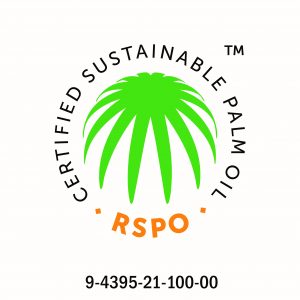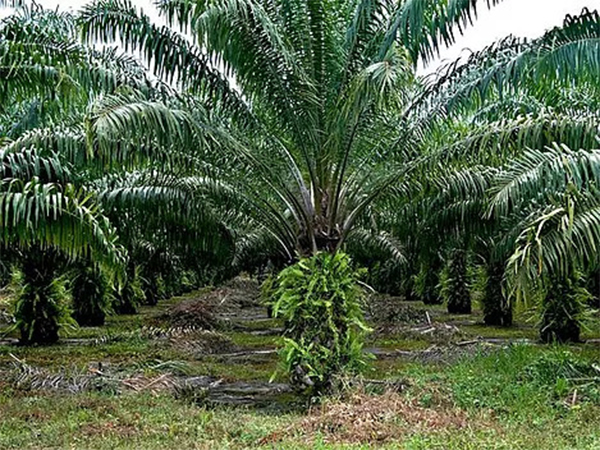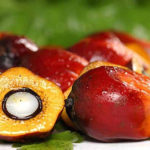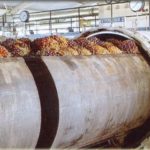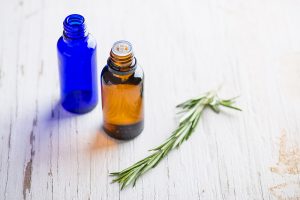https://www.rspo.org/members/13662
Comparison of wax from palm oil vs other vegetable oils.
| Certified Sustainable Palm Wax | Other vegetable waxes |
| During the long life of the palm tree (25-30 years), only the fruit bunches are harvested every year, leaving the tree and top soil intact | Other crops like Soy, rapeseed (canola) or sunflower require annual tillage and harvesting, which compacts the most fertile topsoil |
| Oil Palm enhances biodiversity, attracts fauna n flora, and increases soil fertility | Land is cleared for cultivation of crops thus loosing the original fauna and flora |
| Palm is highest yielding oil crop in the world, with an average global yield of 4.02 tonnes of oil per hectare | Soy, rapeseed, apricot or sunflower requires 4 -10 times more land to produce same tonnage of oil and 20 times more land to produce same tonnage of wax. |
| Requires less water for cultivation | SRequires more water for cultivation |
| Pest resistant tree | Repels wildlife and beneficial insects, increasing the need for pesticides |
| Small family-owned tree farms account for over 30% of palm oil production | There are NO small farms left, providing Non-GMO Soy in US |
| Palm wax production uses no harmful solvents or catalysts. It is separated out of palm oil under extreme temperate fluctuations and pressure. It is a natural colourless and odourless oil which produces high quality wax | Soybean oil is chemically distilled with hexane to extract the oil from flaked oilseeds. Bleached with chlorine and deodorized with Borax to remove color and odour |
| Certified Sustainable by RSPO (Roundtable on Sustainable Palm Oil) | No regulatory authorities, no certifications |
| Excellent adhesion to jar | Mixed with palm wax/ paraffin to adhere to jar as it has low adhesion on its own |
| Suitable for hot climates like UAE due to higher melting point. Last longer as they burn slower | Not suitable for hot climates due to low melting point. Wax can leak fragrance or the candles bend shape if left in an Non – AC environment |
| Excellent cold and hot scent throw | Low Scent throw |
| Burn cleaner and almost soot- free | Emits black soot |
We source our palm wax from a member of the RSPO( Rountable on Sustainable Palm Oil), assuring you of the most earth-friendly products. RSPO issues moratorium on the clearing of new forests, certify existing areas of cultivation, formulate ways to increase the yield and protect Orangutan habitats. At the moment, our wax is certified till MB grade and we strive to obtain higher certifications as the business expands.
Why not Paraffin wax?
Paraffin candles are the most commonly burned candles worldwide. And are the most dangerous to our health. Paraffin is an inexpensive sludge waste product of the petroleum industry that has been bleached then texturized with acrolyn, a known carcinogenic product.
Once burned it releases toxins that are known carcinogens such as benzene and toluene which are inhaled and linger in the areas they are burned in.
Paraffin candles are as dangerous to lungs and even more so if you are in the habit of burning many at the same time. It is also a non-renewable resource thus not earth friendly. Be sure to read the labels and choose 100 percent paraffin-free options as many natural candle manufacturers add paraffin to the wax mixture.
Why not Soy wax?
Soy wax is another alternative to Paraffin wax. After researching its effect on the environment, it became clear that it is not the best available alternative. Soy requires annual tilling and crop rotation, which repel wildlife and beneficial insects, increasing the need for pesticides. Soy bean oil is chemically distilled with hexane and bleached with chlorine before it is hydrogenated to make Soy wax. Most Soy grown in US is GMO( genetically modified).
Soy wax has a lower melting point and too soft to make pillar/ taper candles on its own.
Soy candles burn slower but have a low scent throw. Therefore, soy wax is mostly sold blended with hard waxes like Palm/ Paraffin to retain shape and improve scent performance. More additives are mixed to increase wax adhesion to the jar as it forms wet spots and pulls off from the sides.
Palm Oil Industry and its challenges
Palm oil is in nearly everything – it’s in close to 50% of the packaged products we find in supermarkets, everything from pizza, doughnuts, cookies, chocolate, to soap, deodorant, shampoo, toothpaste and lipstick. It’s also used in animal feed and as a biofuel in many parts of the world. Palm oil is an extremely versatile oil, with many different properties and functions that makes it so useful and so widely used. It is not a surprise then that palm oil is highest consumed oil in the world. With its brilliance comes challenges.
Over the past few decades there has been serious environmental degradation in Southeast Asia where more than 80% of the world’s palm oil is grown; much of this destruction has come from the timber and agricultural industries. Peat lands have been drained, forests have been bulldozed or burned, wildlife habitat (especially that of the orangutan) has been lost, and communities have been displaced.
Why did we still choose palm wax to make candles? That’s because we saw an opportunity to make a difference. Like most environmentalists, we believe that boycotting palm is a bizarre notion, since it’s a known fact that substitutions with other vegetable oils can lead to even further environmental and social harm. Sustainability is a journey, and if companies are rewarded for improving farming practices, we can transform the production of palm oil and make sustainable palm oil the norm rather than an exception.
We didn’t stop wearing cotton clothing because it’s the most pesticide-laden crop in the world; instead, we switched to using organic cotton, increasing demand for it. We didn’t stop brushing our teeth because the first plastic toothbrush ever made is still around, we switched to toothbrushes made with bio degradable and sustainable materials like Bamboo. The use of market forces to promote sustainability has also been proven in the growth of organic agriculture, recycled paper products, alternative energies, and palm oil.
In 2004, the World Wildlife Fund helped found the Roundtable on Sustainable Palm Oil. The RSPO developed a set of criteria to readdress the negative impacts the palm oil industry was having on our planet and its people. These standards promote sustainable farming practices, environmental stewardship, and social responsibility. RSPO issues moratorium on the clearing of new forests, certify existing areas of cultivation, formulate ways to increase the yield and protect Orangutan habitats, demands for bold and concerted action by all stakeholders along the global palm oil supply chain — including companies, financiers, policymakers and consumers. We support RSPO’s work and are a proud member. ‘Check our progress at RSPO Directory
